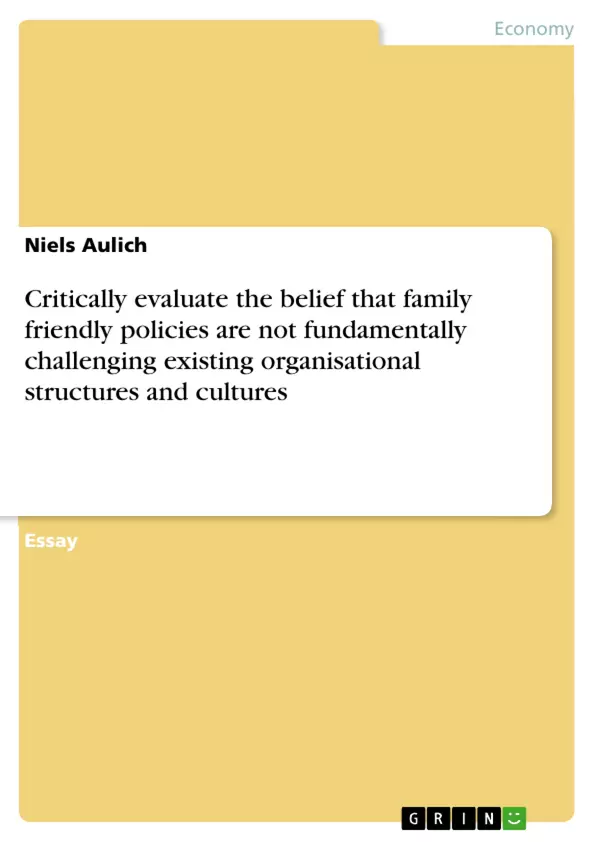It is generally agreed today that working is not the only essential part in life for a human being, rather it is aimed to have both fulfilment within the family, partner or in the social structure and realisation of the personal career goals to reach a life in balance. Furthermore, in times of globalisation related to the increasing international division of labour, skills shortage and the demographic change mean a shift in our common understanding that leads to changing notions not only in an economical point of view but also in a socio-cultural perspective of each individual. In addition to that, companies connect their key to success with a high motivated and passionate employee; to emphasise high commitment sustainably. Thus, family friendly policies (FFP) find their way into the business sector to achieve growing commitment of their workforce internally due to changing work rules or externally, with state intervention in shape of statutory provisions. Moreover, FFP are indicated to alter the existing culture and corporative structure in an unprecedented way which is discussed in sciences, economics and politics widely. The main question which arises is: Do FFP have direct influence on a business entity to alter the organisational structure or even the whole culture and what are the characteristics of those in a more detailed consideration? This essay spars with the topic: Critically evaluate the belief that family friendly policies are not fundamentally challenging existing organisational structures and cultures; in reality “they are playing around at the margins”. The structure of this essay relates to FFP within the business environment and their importance to proof the belief, that they are not changing the existing organisational structure and culture. The main body is separated into four parts. Firstly, this essay will examine the key traits of family friendly policies. Secondly, this essay will consider the term organisational structure and thirdly, the term organisational culture to face the issue of the study. The last chapter of the main body will reveal arguments on the basis of advantages and disadvantages in terms of an argumentative discussion. Finally, the conclusion summarises the main arguments and gives a firm stand.
Inhaltsverzeichnis (Table of Contents)
- Introduction
- Main Body
- Family Friendly Policies
- Organisational Structure
- Organisational Culture
- Argumentative Discussion
- Conclusion
Zielsetzung und Themenschwerpunkte (Objectives and Key Themes)
This essay aims to critically evaluate the assertion that family-friendly policies (FFP) do not fundamentally challenge existing organizational structures and cultures, arguing instead that they merely "play around at the margins." The essay examines the key characteristics of FFP, explores organizational structure and culture, and analyzes the advantages and disadvantages of FFP in an argumentative discussion.
- The impact of family-friendly policies on organizational structures and cultures
- The nature and characteristics of family-friendly policies
- The relationship between organizational structure and culture
- The potential benefits and drawbacks of implementing family-friendly policies
- The argument for and against the belief that family-friendly policies are not fundamentally challenging existing structures and cultures
Zusammenfassung der Kapitel (Chapter Summaries)
The introduction sets the context for the essay by discussing the changing nature of work and the increasing importance of work-life balance. It introduces the concept of family-friendly policies (FFP) and their potential influence on organizational structures and cultures.
The main body of the essay is divided into four sections. The first section examines the key features of FFP, highlighting their role in promoting employee well-being and engagement. The second section delves into the concept of organizational structure, exploring various models and their implications for the implementation of FFP. The third section focuses on organizational culture, discussing its influence on the acceptance and effectiveness of FFP. The fourth section presents an argumentative discussion of the advantages and disadvantages of FFP, considering both their potential benefits and challenges.
Schlüsselwörter (Keywords)
The key focus areas of this essay are family-friendly policies, organizational structure, organizational culture, work-life balance, employee engagement, and the impact of these factors on business success. The essay examines the argument that FFP are not fundamentally challenging existing structures and cultures, exploring the potential for these policies to create significant change within organizations.
Frequently Asked Questions
What are Family Friendly Policies (FFP)?
FFP are workplace rules or statutory provisions designed to help employees achieve a balance between their professional career and family or social life.
Do FFP fundamentally change organizational structures?
This is a subject of debate. The essay critically evaluates whether these policies create real structural change or if they are merely "playing around at the margins" of existing systems.
Why are companies increasingly implementing family-friendly policies?
Drivers include globalization, demographic change, and skill shortages. Companies aim to increase employee motivation, commitment, and sustainability.
How does organizational culture affect the success of FFP?
Organizational culture determines whether policies like flexible working are actually accepted and utilized by employees without fear of career repercussions.
What are the potential disadvantages of FFP?
Challenges can include management difficulties, potential resentment from employees without families, and the costs associated with implementing and monitoring these programs.
- Quote paper
- Niels Aulich (Author), 2012, Critically evaluate the belief that family friendly policies are not fundamentally challenging existing organisational structures and cultures, Munich, GRIN Verlag, https://www.grin.com/document/195049



